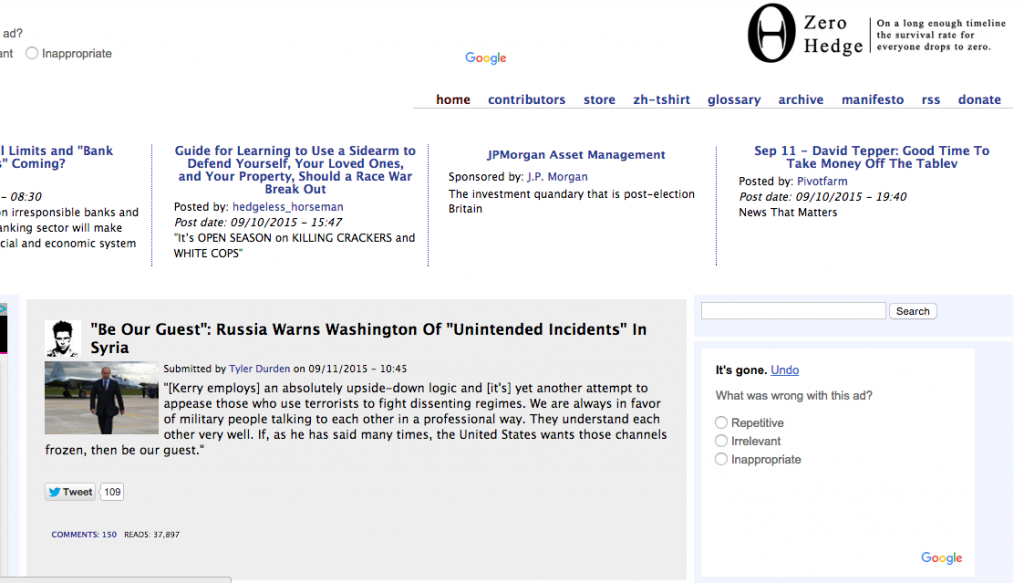Zero Hedge is considered by many to be a financial blog that has been disruptive in the trading sector. Zero Hedge began attracting attention in 2009, and the website has a mission to “widen the scope of financial, economic and political information available to the professional investing public”. It aims to provide a higher standard of financial journalism and free up knowledge for all. Additionally it claims to offer analysis that is not held back by political constraint, to provide greater value in financial journalism. One of the interesting elements of this website is that there are a number of contributors that write for it, and they all use the pseudonym “Tyler Durden” who is a character from the film the Fight Club. The reason for doing this helps to avoid wrongful consequences that could occur from naming journalists. No one really knows how many writers provide content for the website, with some sources suggesting just four, and others stating that it is as many as 40.
The blog pulls together news and provides editorial opinions that are both original and home grown but also that come from external places. It reports on a wide range of different topics, most notably economics, Wall Street and the financial sector. One of the disruptive innovations that it has brought has been the highlighting of the practice of flash trading, bringing this into the public eye. It first highlighted this in 2009, when it ran a series of commentaries that suggested that Goldman Sachs had access to flash order data which gave it the chance to get unfair profits. While the site has been criticised for having a highly negative view and taking a conspiracy theory approach, it has nonetheless led to the questioning of some activities. However, the website has its critics and the Bank of America even blocked its employees from getting access to Zero Hedge in 2012.
Some believe that Dan Ivandjiiski is the main proponent of Zero Hedge but this is also up for debate. Ivandjiiski is a controversial character and is the only writer that has been ascertained to definitely provide content for the blog. He first arrived in the USA to study molecular biology at the University of Pennsylvania with a view to going to medical school afterwards. However instead he began a financial sector career, working for Jefferies and Company in Los Angeles as a junior investment banker. Despite the possibility that Ivandjiiski is the writer that brought the dubious practices of Goldman Sachs to light, the man is not squeaky clean himself, and in 2005 he was stopped from working in a broker-dealer capacity as a result of carrying out insider trading of $780. Overall the site is criticised for using the research of others and basically just adding a layer of economic misery to it and then popping it up onto Zero Hedge. The site has received many requests to remove posts over the years.
Love it or hate it, Zero Hedge does provide a different perspective on news stories that are occurring in the financial sector. Additionally, the website is relatively easy to use, as it has a long list of topics that readers can click on to find out more. These range from Boom Bust to Demonocracy, to Naked Capitalism and China’s Financial Markets. The content available provides an interesting alternative perspective to other blogs that are available. This is done with the view to vocalise “public dissent.” Zero Hedge does very well, and by September 2009 it was already attracting a greater level of traffic than other established financial blogs. It was attracting approximately 333,000 unique visitors a month, despite its propensity for a somewhat doom and gloom approach. The website itself suggests that much of this readership (66%) comes from Wall Street. By 2012 its traffic was estimated to have risen to 1.8 million people monthly.
Zero Hedge has certainly attracted a good deal of controversy in its musings on the financial sector and interesting theories on conspiracy. Open minded industry professionals can likely benefit from reading the posts to get a different, more disruptive opinion than that which is available elsewhere. We should remember that it is certainly not a bad thing to think outside of the box, and that diversity breeds innovation.
HedgeThink.com is the fund industry’s leading news, research and analysis source for individual and institutional accredited investors and professionals







































